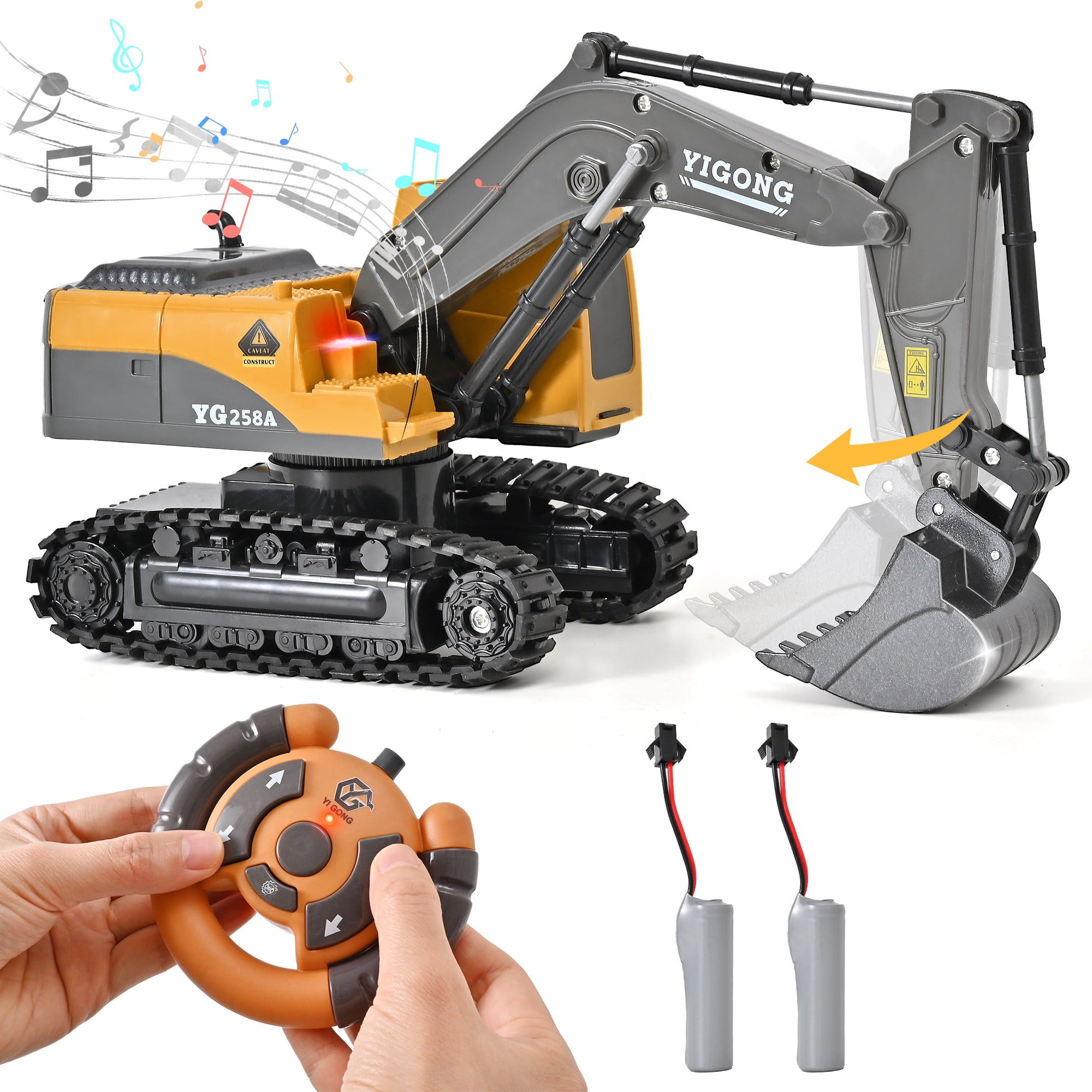Understanding the Role of a rc excavator in Large-Scale Construction Projects
Wiki Article
Understanding Just How Excavator Functions and Its Effect on Effectiveness
Excavators play a necessary role in building and construction and mining procedures, relying upon a complicated interplay of mechanical and hydraulic systems. Their capability to perform a range of tasks depends upon both their style and the innovation incorporated within. Understanding these parts can considerably impact functional performance and productivity. As developments remain to improve the industry, one must take into consideration just how these modifications will affect future practices and performance.The Fundamentals of Excavator Mechanics

The Function of Hydraulic Solutions in Excavators
At the heart of excavator operation lies the hydraulic system, which plays a critical function in powering the maker's features and activities. This system uses pressurized hydraulic liquid to move power, allowing numerous activities such as swinging, lifting, and excavating. By taking advantage of the principles of hydraulics, excavators can execute tasks with amazing accuracy and pressure, boosting total operational efficiency.The hydraulic system consists of crucial elements, including shutoffs, cyndrical tubes, and pumps, which function with each other to regulate the circulation and instructions of the fluid. When the operator engages the controls, the hydraulic fluid is directed to details cyndrical tubes, converting the driver's commands into physical movement. This mechanism enables responsive and smooth activities, which are important in construction and excavation environments. double e volvo rc excavator. The performance of the hydraulic system straight impacts the productivity and convenience of the excavator, making it a vital aspect in modern excavation proceduresSecret Components of an Excavator
Comprehending the vital components of an excavator is essential for comprehending how this powerful equipment operates. An excavator is composed of several substantial aspects, including the undercarriage, residence, pail, boom, and arm. The undercarriage provides security and mobility, commonly featuring wheels or tracks to navigate different terrains. Your house has the engine and hydraulic systems, enabling the operator to regulate activity and power the machine. The boom extends from your house, making it possible for vertical reach, while the arm attaches to the bucket, helping with digging and training operations.Additionally, the taxicab houses the operator, furnished with controls for precise maneuvering. Each of these parts plays an important function in the excavator's overall performance, contributing to its performance and performance on building and construction websites. Comprehending these components assists in preserving and enhancing excavator performance, guaranteeing tasks are completed safely and effectively.Attachment Versatility and Its Benefits
Attachment convenience is an important facet of excavators, enabling drivers to change between different devices customized for specific tasks. This versatility not just boosts task performance yet also contributes to cost-effectiveness by minimizing the demand for numerous machines. Understanding the different kinds of attachments available can greatly affect the general efficiency and capability of an excavator on work websites.Kinds of Accessories
While excavators are mainly recognized for their excavating abilities, their real adaptability depends on the large variety of add-ons readily available. These add-ons boost the excavator's performance, enabling it to do different tasks past excavation. Typical add-ons consist of containers (for excavating and scooping), hydraulic thumbs (for realizing products), and augers (for drilling openings) Grapples are used for relocating and dealing with particles, while rippers can separate tough surface areas. Other specialized add-ons, such as trenchers and plows, make it possible for excavators to adapt to particular work demands. This variety not just boosts the device's energy across different fields, including construction, landscape design, and demolition, however also enables drivers to customize their equipment to satisfy specific job needs effectively.Raised Job Effectiveness
Taking full advantage of work efficiency is a main advantage of making use of numerous excavator attachments. Different attachments enable an excavator to perform several jobs without requiring to change tools, saving important time and labor. Making use of a hydraulic hammer can damage concrete while a container accessory can dig deep into soil, enabling a smooth operations. This flexibility lowers downtime related to devices adjustments and enhances efficiency on-site. In addition, specialized attachments enhance accuracy in jobs such as grading or landscape design, resulting in greater top quality end results. The capacity to adjust to numerous work requirements not only enhances procedures however likewise decreases the demand for added equipment, making sure that jobs are finished quickly and successfully. In general, accessory adaptability significantly adds to raised work performance in excavation work.Cost-Effectiveness and Adaptability
Cost-effectiveness is a substantial benefit of making use of functional excavator add-ons. These accessories enable a solitary excavator to perform numerous jobs, minimizing the demand for additional equipment and labor - double e volvo rc excavator. By changing between buckets, hammers, and grapples, drivers can take on numerous jobs, from digging to demolition, consequently maximizing equipment application. This versatility not just lowers functional prices yet additionally minimizes downtime related to changing tools. Additionally, the ability to tailor excavators with specialized accessories enhances performance, as they can efficiently manage diverse jobs according to project needs. In conclusion, the combination of cost-effectiveness and flexibility in excavator add-ons adds to improved functional efficiency and resource allotment in building and construction and excavation projects
Advanced Technology in Modern Excavators
Modern excavators are increasingly outfitted with sophisticated innovation that transforms excavation processes. Automation streamlines procedures, while improved fuel efficiency reduces functional expenses. In addition, clever control systems improve accuracy and safety and security, noting a considerable development in excavation equipment.Automation in Excavation Processes
As excavation modern technology progresses, automation has become an important element in boosting effectiveness and precision on work sites. Modern excavators are outfitted with sophisticated automated systems that facilitate jobs such as grading, excavating, and trenching with very little operator treatment. These systems utilize sensors, GPS, and artificial intelligence algorithms to ensure accurate placing and deepness control, considerably lowering the margin for error. In addition, automation allows drivers to concentrate on tactical decision-making rather than hands-on controls, leading to enhanced efficiency overall. Such developments not just improve operations but likewise boost safety by lessening human mistake in intricate operations. As a result, the assimilation of automation in excavation processes represents a significant development in building modern technology, driving the industry towards higher effectiveness and performance.Boosted Gas Effectiveness
Innovations in technology have also led to considerable enhancements in fuel effectiveness for contemporary excavators. Modern machines are equipped with advanced engines that optimize power result while reducing gas usage. These engines use innovative combustion technologies, such as turbocharging and straight fuel shot, to improve performance and effectiveness. Furthermore, light-weight products in building and construction decrease overall weight, allowing for much less power expenditure throughout procedure. The introduction of variable speed controls enables drivers to change engine performance according to particular tasks, further minimizing gas usage. Because of this, these improvements not only lower functional costs however likewise add to ecological sustainability by decreasing discharges. In general, enhanced gas efficiency in excavators is an important development that strengthens efficiency and economic feasibility in the building industry.Smart Control Solution
While drivers browse progressively complex work sites, clever control systems in excavators have actually emerged as crucial tools for go to website boosting effectiveness and accuracy. These sophisticated modern technologies use sensing units and algorithms to check various criteria such as load weight, surface problems, and operational efficiency. By immediately readjusting hydraulic functions, wise systems optimize device performance, causing boosted productivity and decreased endure components. In addition, operators gain from user-friendly interfaces that supply real-time feedback and diagnostics, permitting for informed decision-making. This assimilation of innovation not only simplifies operations but also lessens human mistake, adding to safer workplace. As the building and construction sector continues to develop, wise control systems will certainly play an essential role in shaping the future of excavator effectiveness and performance.Enhancing Functional Performance With Excavators
Excavators play an important function in improving functional effectiveness across different building and construction and excavation jobs. Their flexibility permits numerous jobs, consisting of excavating, product, and training handling, which streamlines operations and decreases the requirement for extra tools. With powerful hydraulic systems, excavators can do sturdy tasks with precision, considerably reducing the time required to complete jobs. The combination of innovative modern technology, such as GPS and automated controls, better maximizes their procedure, allowing operators to attain better precision and minimize product waste. Additionally, modern-day excavators are created to take in less gas and reduce exhausts, adding to both price savings and ecological sustainability. By making use of excavators successfully, building and construction teams can boost performance, meet project deadlines, and improve total site monitoring. This multifunctionality and effectiveness make excavators important devices in the contemporary construction landscape.The Future of Excavators in Building And Construction and Mining Industries
As the building and mining industries progress, the future of excavators is poised for considerable transformation driven by technical development and transforming operational needs. Advances in automation and expert system are improving excavator capabilities, permitting boosted precision and performance in operations. Self-governing excavators are arising, decreasing the requirement for human treatment and reducing the risk of accidents.Moreover, the combination of telematics and IoT modern technology enables real-time tracking of machine performance and predictive upkeep, optimizing uptime. Green designs, including hybrid and electrical versions, are getting grip, aligning with sustainability goals within the industry.Additionally, using innovative products and lighter styles boosts gas effectiveness while keeping efficiency standards. As these trends development, excavators will play a crucial function in meeting the enhancing demands for efficiency and security in building and construction and mining, inevitably changing functional landscapes.Regularly Asked Inquiries
Exactly How Do Weather Condition Conditions Influence Excavator Efficiency?

Weather condition problems greatly influence excavator performance, as rainfall and mud can hinder grip and stability, while severe temperature levels might affect hydraulic systems. Operators must adapt to these variables to guarantee ideal performance and security during procedures.
What Precaution Should Operators Follow While Making Use Of Excavators?
Precaution for excavator drivers include putting on ideal personal protective devices, conducting pre-operation assessments, ensuring proper interaction with ground workers, keeping a risk-free distance from above hazards, and adhering to well-known functional procedures to avoid mishaps.How Frequently Should Excavators Be Maintained for Optimal Efficiency?
Excavators need to be preserved routinely to guarantee peak performance, commonly every 250 operating hours or as specified by the maker. Regular checks enhance integrity, protect against unexpected malfunctions, and prolong the life expectancy of the equipment.
What Is the Typical Lifespan of an Excavator?
The ordinary click resources lifespan of an excavator visit the website generally ranges from 10,000 to 15,000 hours of procedure. Variables affecting long life consist of maintenance methods, operating conditions, and the quality of the device itself, affecting general productivity and efficiency.
Can Excavators Run on Irregular Terrain Successfully?
Excavators can run properly on uneven terrain because of their expressed designs and adjustable tracks. These functions permit them to keep stability and traction, enabling effective operation in difficult environments commonly experienced in building and landscape design jobs. Each of these parts plays an important duty in the excavator's total performance, adding to its performance and effectiveness on building and construction websites. Optimizing work effectiveness is a primary benefit of utilizing numerous excavator accessories. While operators navigate significantly intricate task websites, clever control systems in excavators have actually emerged as vital tools for improving efficiency and accuracy. Excavators play a necessary duty in boosting functional performance across various construction and excavation jobs. Breakthroughs in automation and fabricated intelligence are reshaping excavator abilities, permitting for enhanced precision and performance in procedures.Report this wiki page